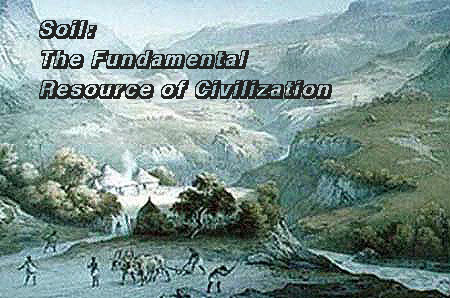
|

|
The importance of soil is seldom recognized. In fact, we have a saying, "as common as dirt," which is applied to things of little or no value. Soil, however, is not "dirt."
Soil covers large parts of the dry-land surface of the globe; without it, the earth's surface would be barren rock and sand and could not support life. Soil is composed of chemically weathered rock in fine granular form mixed with humus, partially decomposed organic matter. It also contains atmospheric gases, water, and living organisms. Air, rock, water, sunlight: these are the sources of all life, and they come together dynamically in the top layer of soil. Soil is the biologically active zone where the atmosphere, water, sunlight, and the earth's crust mix and interact: the soil is highly active chemically and physically and also highly complex in its composition. Soil is constantly changing its composition in response to changing conditions. It supports a host of communities of living things which are interdependent and survive by endlessly exchanging energy and chemical resources.
To understand the importance of the soil in sustaining terrestrial life on the planet, it is helpful to think of the soil's critical part in
a number of the natural cycles and interactions on which all life depends:
Many of the chemical and physical processes which sustain these cycles take place in the soil. The soil is one of the planet's
most active regions of energy exchange, particularly through the decomposition of organic materials.
Soil is obviously the medium necessary for terrestrial plant life. And since human beings live on plants and animals, which in turn nourish themselves on plants, it is easy to see why soil is the fundamental resource of civilization. It is in fact the fundamental resource of terrestrial life.
| Next Page | Ag Rev Home |